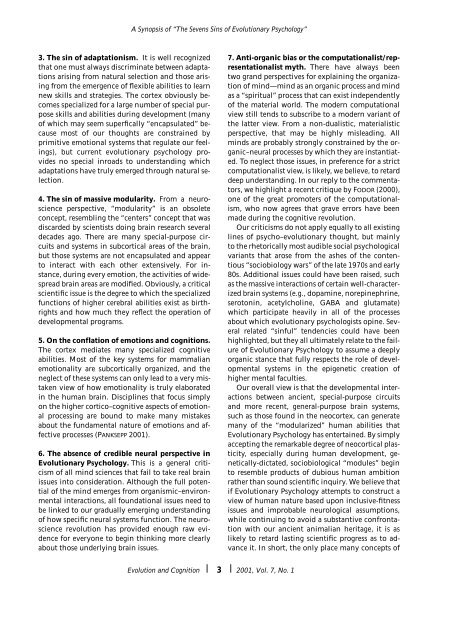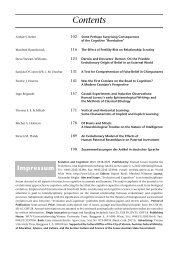The Seven Sins of Evolutionary Psychology - Konrad Lorenz Institute
The Seven Sins of Evolutionary Psychology - Konrad Lorenz Institute
The Seven Sins of Evolutionary Psychology - Konrad Lorenz Institute
Create successful ePaper yourself
Turn your PDF publications into a flip-book with our unique Google optimized e-Paper software.
A Synopsis <strong>of</strong> “<strong>The</strong> <strong>Seven</strong>s <strong>Sins</strong> <strong>of</strong> <strong>Evolutionary</strong> <strong>Psychology</strong>”3. <strong>The</strong> sin <strong>of</strong> adaptationism. It is well recognizedthat one must always discriminate between adaptationsarising from natural selection and those arisingfrom the emergence <strong>of</strong> flexible abilities to learnnew skills and strategies. <strong>The</strong> cortex obviously becomesspecialized for a large number <strong>of</strong> special purposeskills and abilities during development (many<strong>of</strong> which may seem superfically “encapsulated” becausemost <strong>of</strong> our thoughts are constrained byprimitive emotional systems that regulate our feelings),but current evolutionary psychology providesno special inroads to understanding whichadaptations have truly emerged through natural selection.4. <strong>The</strong> sin <strong>of</strong> massive modularity. From a neuroscienceperspective, “modularity” is an obsoleteconcept, resembling the “centers” concept that wasdiscarded by scientists doing brain research severaldecades ago. <strong>The</strong>re are many special-purpose circuitsand systems in subcortical areas <strong>of</strong> the brain,but those systems are not encapsulated and appearto interact with each other extensively. For instance,during every emotion, the activities <strong>of</strong> widespreadbrain areas are modified. Obviously, a criticalscientific issue is the degree to which the specializedfunctions <strong>of</strong> higher cerebral abilities exist as birthrightsand how much they reflect the operation <strong>of</strong>developmental programs.5. On the conflation <strong>of</strong> emotions and cognitions.<strong>The</strong> cortex mediates many specialized cognitiveabilities. Most <strong>of</strong> the key systems for mammalianemotionality are subcortically organized, and theneglect <strong>of</strong> these systems can only lead to a very mistakenview <strong>of</strong> how emotionality is truly elaboratedin the human brain. Disciplines that focus simplyon the higher cortico–cognitive aspects <strong>of</strong> emotionalprocessing are bound to make many mistakesabout the fundamental nature <strong>of</strong> emotions and affectiveprocesses (PANKSEPP 2001).6. <strong>The</strong> absence <strong>of</strong> credible neural perspective in<strong>Evolutionary</strong> <strong>Psychology</strong>. This is a general criticism<strong>of</strong> all mind sciences that fail to take real brainissues into consideration. Although the full potential<strong>of</strong> the mind emerges from organismic–environmentalinteractions, all foundational issues need tobe linked to our gradually emerging understanding<strong>of</strong> how specific neural systems function. <strong>The</strong> neurosciencerevolution has provided enough raw evidencefor everyone to begin thinking more clearlyabout those underlying brain issues.7. Anti-organic bias or the computationalist/representationalistmyth. <strong>The</strong>re have always beentwo grand perspectives for explaining the organization<strong>of</strong> mind—mind as an organic process and mindas a “spiritual” process that can exist independently<strong>of</strong> the material world. <strong>The</strong> modern computationalview still tends to subscribe to a modern variant <strong>of</strong>the latter view. From a non-dualistic, materialisticperspective, that may be highly misleading. Allminds are probably strongly constrained by the organic–neuralprocesses by which they are instantiated.To neglect those issues, in preference for a strictcomputationalist view, is likely, we believe, to retarddeep understanding. In our reply to the commentators,we highlight a recent critique by FODOR (2000),one <strong>of</strong> the great promoters <strong>of</strong> the computationalism,who now agrees that grave errors have beenmade during the cognitive revolution.Our criticisms do not apply equally to all existinglines <strong>of</strong> psycho–evolutionary thought, but mainlyto the rhetorically most audible social psychologicalvariants that arose from the ashes <strong>of</strong> the contentious“sociobiology wars” <strong>of</strong> the late 1970s and early80s. Additional issues could have been raised, suchas the massive interactions <strong>of</strong> certain well-characterizedbrain systems (e.g., dopamine, norepinephrine,serotonin, acetylcholine, GABA and glutamate)which participate heavily in all <strong>of</strong> the processesabout which evolutionary psychologists opine. Severalrelated “sinful” tendencies could have beenhighlighted, but they all ultimately relate to the failure<strong>of</strong> <strong>Evolutionary</strong> <strong>Psychology</strong> to assume a deeplyorganic stance that fully respects the role <strong>of</strong> developmentalsystems in the epigenetic creation <strong>of</strong>higher mental faculties.Our overall view is that the developmental interactionsbetween ancient, special-purpose circuitsand more recent, general-purpose brain systems,such as those found in the neocortex, can generatemany <strong>of</strong> the “modularized” human abilities that<strong>Evolutionary</strong> <strong>Psychology</strong> has entertained. By simplyaccepting the remarkable degree <strong>of</strong> neocortical plasticity,especially during human development, genetically-dictated,sociobiological “modules” beginto resemble products <strong>of</strong> dubious human ambitionrather than sound scientific inquiry. We believe thatif <strong>Evolutionary</strong> <strong>Psychology</strong> attempts to construct aview <strong>of</strong> human nature based upon inclusive-fitnessissues and improbable neurological assumptions,while continuing to avoid a substantive confrontationwith our ancient animalian heritage, it is aslikely to retard lasting scientific progress as to advanceit. In short, the only place many concepts <strong>of</strong>Evolution and Cognition ❘ 3 ❘ 2001, Vol. 7, No. 1








